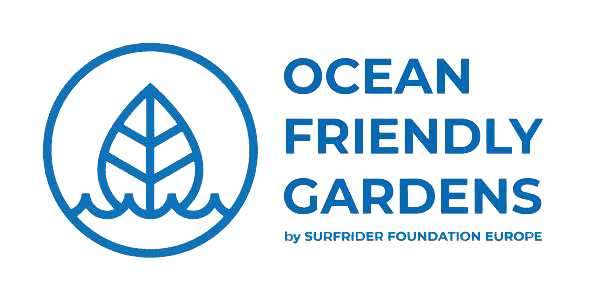Ocean Friendly Gardens
Programme for preserving water quality in coastal watersheds through sustainable rainwater management.


Discovering Ocean Friendly Gardens
The Ocean Friendly Gardens programme considers urban landscapes and streets as solutions to combat pollution in aquatic environments.
As the primary natural filters, soil, flora and fauna must be preserved and developed in urban areas.
The creation of rain gardens optimises water management at the plot level.
A source of problems
Aquatic environments are regularly polluted downstream from urbanised areas. Soil sealing prevents rainwater from infiltrating the ground.
The rainwater runs off and is partly collected by sewage systems which, when saturated, discharge untreated wastewater laden with pollutants into aquatic environments.
Many other pollutants are released into the natural environment as a result of leaching from impermeable soils (hydrocarbons, heavy metals, etc.). These pollutants have harmful consequences for humans and the environment: vulnerability of bathing waters, closure of beaches, degradation of natural environments and biodiversity, etc.
The watershed,
the receptacle for our pollution
80% of ocean pollution comes from the continent, i.e. from watersheds, and is carried by water.
Taking sustainable action to protect the oceans therefore means acting at the source of the problem.
The ocean, the coastline and, more generally, water quality are markers and reflections of our societies.
Faced with the challenge of climate change, it is important for regions to be resilient and for development projects to be sustainable and accepted by the population.
In the Aquitaine pilot region (Biarritz), the consequences are already visible:
- Vulnerability of bathing waters;
- Degradation of soils and natural aquatic environments;
- Degradation of biodiversity;
- Submersion;
- Beach closures;
- Increased risk of flooding;
- Increase in heat islands.
Towards sustainable
rainwater management
Through the Ocean Friendly Gardens programme, the Surfrider Foundation aims to promote more sustainable rainwater management based on the principle of plot-by-plot management. This involves managing water as close as possible to where it falls and capitalising on its recovery (saving, storing, distributing, infiltrating and purifying).
Each plot is thus considered as a ‘small watershed’ where water should be optimised in harmony with local landscape and technical specificities, including uses, rainfall volume, soil type, sun exposure, topography and surface area.
This programme aims to improve urban stormwater management by promoting good development practices and sustainable alternatives, in particular through the creation of eco-friendly rain gardens.
This development will promote water flow regulation, reduce downstream water volumes, encourage soil infiltration, contribute to water purification and have direct and indirect beneficial effects on the environment.
Ocean Friendly Gardens programme actions
Surfrider Foundation proposes to implement three types of public initiatives based on education, training and participatory projects.
From educational workshops on water pollution to the creation of rainwater harvesting systems and training in alternative rainwater management techniques, the Ocean Friendly Gardens programme takes a cross-cutting approach and encourages public participation in its implementation.
Education
Various topics will be explored with the public to promote a better understanding of regional issues (water cycle, garden biodiversity, pollutants and pollution, urban development).
The awareness-raising and educational tools offered (landscape reading, urban discovery walks, fun models, online courses, etc.) enable tailored and targeted communication with different audiences.
Trainings
Through the involvement of experts and professionals (landscape architects and urban planners), workshops, training courses and themed web conferences are offered to enable all citizens to get involved in practical ways in preserving the quality of aquatic environments and to enrich their knowledge and skills on alternative rainwater management techniques.
Implementation of participatory projects
Participatory projects will be organised at various sites as soon as an issue is identified.
The pilot sites identified are schools, private gardens, communal plots, co-owned properties and private plots. There may be a variety of complementary developments, such as the creation of a retention basin, vegetated swales, the installation of rainwater harvesting systems and the planting of endemic and adapted species.
The beneficial effects of rain gardens

The rainwater management promoted by the Ocean Friendly Gardens programme has many benefits for the region, the community and citizens. In addition to combating water pollution by preserving the natural purifying functions of the soil, there are many other beneficial effects.
Promoting biodiversity: encouraging endemic and local plants and seedlings, creating habitats for wildlife, preserving the ecological functions of waterways and aquatic environments, preserving and maintaining soil
Adapting to climate change: flood prevention, prevention among populations, support in risk management, reduction of heat islands, anticipating the effects of extreme weather events, etc.
Cost savings: reduction in water management costs, prevention of closures of bathing areas or shellfish farming areas, reduction in water consumption, etc.
Improving the living environment: enhancing urban landscapes, creating places for relaxation and leisure, restoring communal spaces to the heart of social life, etc.
